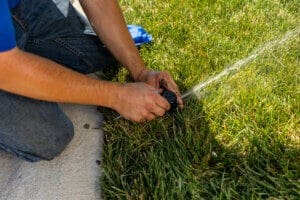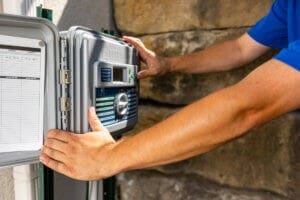Homeowners that want to keep their properties looking beautiful and healthy, while also reducing the amount of human input their irrigation system requires, are prime candidates for investing in smart irrigation systems. There are still a significant number of homeowners that are still managing their irrigation needs manually, however, and many of them may not even be aware that smart irrigation systems exist. We’re going to dive into what they are, what they do, and how they can benefit you.
What Are Smart Irrigation Systems?
Smart irrigation systems are irrigation systems that are created and specifically designed for efficiency and effectiveness. Their efficiency means that your irrigation tasks will require less water, and their effectiveness means that your irrigation tasks will be performed properly and consistently.
Irrigation systems that have smart capabilities often have several components that conventional irrigations, such as a smart wi-fi controller, rain & soil sensors, complex water mapping, and AI components that coordinate with local weather forecasts.
Wi-Fi Enabled Controller
A smart wi-fi controller is the backbone of the entire irrigation system, just as the controller is the backbone of a conventional irrigation system. The controller will control various aspects of the system’s operation, such as which heads will spray, at what times the irrigation tasks will be carried out, and for how long. This is the smart link between all other components and the network. Your controller will often also have an offline battery backup mode to be able to use the last-known program in the event of a power or internet outage.
Rain & Soil Sensors
Rain and soil sensors are frequently used to keep the system updated on the current conditions. While technicians will periodically monitor the water and soil conditions manually, having smart rain and soil sensors can help your smart irrigation system to operate much more effectively and efficiently.
These sensors are one of the most important parts of the upgraded functionality of a smart system compared to a conventional system. With a conventional system, you rely on consistent, timed, programming to operate the irrigation tasks, even if the tasks aren’t needed, or worse, should have been done much sooner. With smart sensors, once the soil sensors indicate a particular zone is too dry, they can activate immediately and remedy the situation.
Watering Powered By AI
One of the biggest benefits of having your irrigation system upgraded to smart capability will be its ability to interface with local weather data stations, to create the ideal watering schedule for you. If the forecast has predicted a very dry, hot week, your controller will have created your watering program, but if the controller software learns that a surprise shower is now in the forecast, it can delay watering, or even shut it off as soon as the rain starts. This feature makes sure you always have the perfect irrigation plan for the current conditions.
Customized Water Mapping
Water mapping is a relatively new ability that is gained through the use of special, computer-controlled spray heads that can self-adjust to spray in any pattern needed. They can make sure outdoor sitting areas and open windows don’t get surprised when the system activates, and because they can spray in any pattern including irregular shapes, they can increase the efficiency and effectiveness of the system considerably.
To Get Started On Your Smart Irrigation System
If you have more questions about smart irrigation systems, or simply want to arrange for your project estimate, feel free to reach out to High Prairie today and you can speak to a trusted local irrigation expert.




